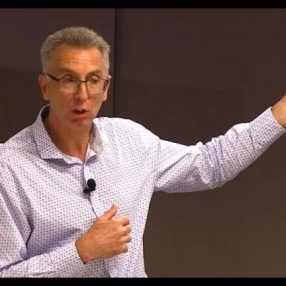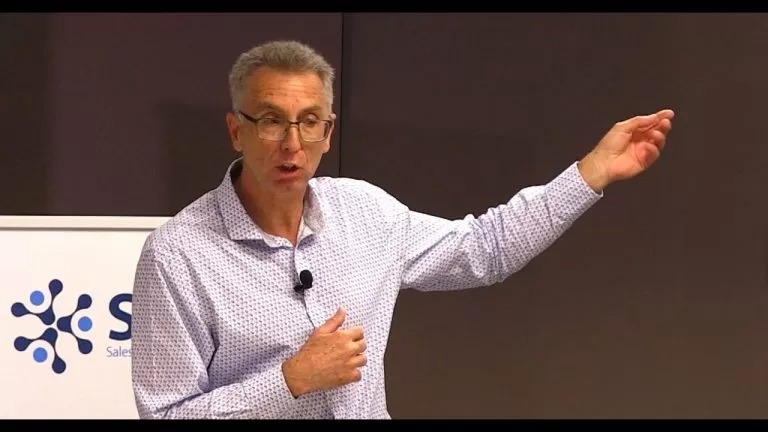
Mike Adams Podcast Transcript on Sales Storytelling
Transcript of podcast interview with Steven Norman and Mike Adams
Steven: Welcome to the show everybody! I’m really pleased today to have a special guest, Mr Mike Adams, who has just written a book called Seven Stories Every Salesperson Must Tell. This book really blew my mind, and I think it’s a missing link for a lot of sales organisations and a lot of salespeople, so I’m really looking forward to getting into this discussion. Mike, welcome to the program!
Utilising his gift for storytelling Mike Adams demonstrates how to use storytelling techniques to build credibility and engagement.
Mike: Thanks for having me on the program, Steven!
Steven: Mike, could you just tell us a bit about your background and what led you to write this great book here?
Mike: Yeah, absolutely. I studied as an electrical and mechanical engineer, with absolutely no intention of being a salesperson. I was fortunate enough to get a job out of university with a company called Schlumberger, which is a massive oil & gas services organisation, a bit like the Siemens of oil & gas. I worked all over the world, throughout Asia, China, Indonesia and Malaysia, and then I was transferred to London. I became a specialist in software for analysing rock physics, I was actually working on a very early version of a neural network in the mid-90s, and I was called in to my boss’ office and he goes “Mike, we’ve got this great career opportunity!” – whenever you hear “career opportunity” in a big corporation, you should be careful, right? – they said, “We want you to go to Norway…” and I’m going “Yes!” “…and be a salesperson,” and I go “No…” [laughs] “No, I don’t want to…”
Steven: Oh, so you’ve been an engineer all the way to that point?
Mike: That’s right, and that was just over 20 years ago. I’d been an engineer and I loved that, and that was how I had my career planned. And my wife was eight months pregnant, so my immediate thought was “Well, that’s impossible anyway,” but she really wanted to go to Norway, and we flew on the last day that she could fly to Norway, with a two-year-old and a heavily pregnant wife, into a public-only hospital system in Stavanger, in Norway, so that was interesting. And then I was on my very early version of Nokia mobile phone, trying to sell while she was giving birth! [laughs]

Steven: It sounds like it worked out well though!
Mike: Yeah. Look, Schlumberger is a fabulous company, they train their salespeople really well. But I had incredible good fortune, Steven: I sold the biggest deal in our division worldwide in my first year, and it was complete accident! I just connected with someone, what the CEB would call a mobiliser, I connected with a person in a big oil company who looked at our new software, which was very new, and thought “I really need that. But not only that, my company needs it, and they need it everywhere in the world.” And there just happened to be a big presentation in Stavanger for all the leaders of this oil company, and this guy, my client, he got up on stage and just presented our software to them! I was actually sitting next to my boss at the time, he’d flown over from London, and when he got to the end of this presentation, he looked at me and he’s like “Mike, that’s just incredible, that’s just amazing what you’ve done!” and I hadn’t done anything! [laughs] But you know what happens: if you sell a big deal, you think you’re good.
Steven: Right. You thought that was normal, that you need someone who does all the running for you!
Mike: Exactly, exactly! It took me a little while to realise that this doesn’t happen all the time. But, you know, that was enough to make me think I could sell, and the excitement of bringing a big deal in and everything… I loved it, and I ended up running a sales team throughout Europe and then in Russia, building a team in Russia, which was fantastic. And then it was time to come home, my dad was sick in Australia, and we chose to settle in Melbourne. We had bought a house there, but we’d never lived in Melbourne and we had no contacts, apart from my sister, so I was thinking like I’m never going to get a job, because there’s no oil & gas business in Melbourne. But I reworked my CV to just show all the selling activities that I’d done, and I told a very good story. I know it was a good story, Steven, because I got a job selling mobile telecommunications equipment to Telstra for Siemens, and I used to joke to my friends at the time that I’m perfect for that job: I know nothing about the client, my company or mobile telecommunications, so… [laughs]
Steven: Just a few negatives…

Mike: A few negatives, yeah – I managed to put a cross on every box your classic job questionnaire has! But anyway, I had a lot of success there, and I ended up being transferred overseas when it became Nokia-Siemens, and I ran a big sales team, more than a hundred people, out of Kuala Lumpur, travelling all around Asia.
Then I went back to the oil & gas industry, because I figured once you changed industries once it wasn’t that hard, I went back and worked for Halliburton. And then I was asked, when it was time to come back to live in Melbourne – we had three boys by that stage, and schooling was getting to a point where we needed to be back home – and I was actually asked to come and work in the facility services industry for Spotless, and help them build their mining and oil & gas camp portfolio. These are really big contracts for cleaning and catering, but they’re really logistics contracts, multimillion-dollar deals. So I came back and did that and it was fascinating, I got to fly all over the country. I did two more industry changes after that, changing industry was a snap after I’d done that four times.
Then a bit over three years ago I decided that I’d had enough of big corporations, which I’m sure you have plenty of stories there, and I want to see if I could solve a particular issue. The issue was granted in my experience of being the flying manager that comes in to help with the biggest deal in the company, I might fly to Jakarta or Beijing or Delhi or wherever, and I would be in these meetings, meeting at a higher level than the salesperson or the local country team would normally meet, because they’d use my visit to help them secure that meeting, so we’d usually meet with the CEO or a high-level exec, and my recurring experience was the salespeople just saying the wrong thing: not building rapport, not really understanding the client’s situation, not taking that opportunity to properly connect.
That’s really what I wanted to do building my own consulting company, I wanted to see if I could help salespeople say the right thing. And that’s very challenging, it’s extremely challenging! You can change them in the short term, but it’s very challenging to change poor selling conversation habits. And I’ve found that out, because as an engineer I used to ring my clients’ sales guys up six months after I did some training with them, and it was so disappointing, because they’d forgotten pretty much everything. That is the sad fact of anyone who wants to help the sales team, is there’s not much that works well. But I had decided, using stories in my own career, and I had used stories to get some fantastic jobs for myself and to win business, that I wanted to teach. Firstly, can you teach storytelling? I wasn’t sure. But I started teaching storytelling, and this really works. And now you can ring any of my sales guys and ask them to tell you a story from six months ago and they will be able to do it. Because stories are memorable, and it makes a difference.
Steven: That’s a key thing, isn’t it? Most of the training that salespeople do or most of the systems we ask them to follow, six months later they’d ignored it and it’s gone.
Mike: Gone. If you didn’t coach them continuously on it and check what they’re doing, it’s gone. But, if you help them prepare a compelling company story – and we’ll start talking about what the seven stories are – if you helped them prepare good stories and drill them to just tell them – this happens over a short period of time, over a few hours – they will remember the story, they’ll tell the story to their clients, and they’ll report back very excitedly and tell you what happened when they tell that story, which is wonderful. And what we’re doing here is we’re teaching them rapport and we’re teaching them how to be persuasive in a different way. That’s really important for salespeople.
Because in your average sales team, Steven, maybe 10 or 15 percent are really going well and selling well and they know what they’re doing, they’re probably unconsciously telling good stories, and the rest are struggling; they have occasional success, but they struggle. Most sales teams struggle.

Steven: Yeah. So, what is a good story?
Mike: It’s really important that your listeners understand what a story is. I met Shawn Callahan, he started a storytelling business back in 2004, an international storytelling business called Anecdote, and he told me that in 2004 you couldn’t even use the word “story” in a business context, because people thought it was just childlike. Now everyone uses the word “story”, but they usually use it incorrectly.
So the first thing to know is that a story must be a sequence of related events. If you tell me your company was founded in 1986 and you’re in five capital cities and you’re the best at this and that, that’s not a story; that’s a set of facts. It must be a sequence: this happened, then this happened, then this happened. I just told you my personal story, and I told it to you in a sequence. So if it’s not a sequence of events, it’s not a story, and whoever is saying the word “story” is using the word the wrong way, and you failed to understand what we’re talking about when we talk about storytelling, so that’s the first point.
If you don’t start your story with a setting, for example “20 years ago when I was an engineer…” if you don’t start it with for example a setting in England… and usually a setting means a time and a place. It turns out there are places in our brain for remembering places and time, and they are strong triggers for memory. But if you don’t start with a setting, your audience don’t know you’re telling a story, so they won’t perk up and listen. Because the wonderful thing about stories is people pay attention.
Because the next point about stories is good stories are unpredictable and they’re surprising, and we know that. We know when someone starts to tell a story, we go “This is a story,” and we listen, because we’re listening for the unpredictable, hook, and that’s critically important.
…We leave the interview there for now. Follow the link below and click play to enjoy the full 39 minute podcast.
Listen to the complete Podcast with Mike Adams.
Leave me your comments!



